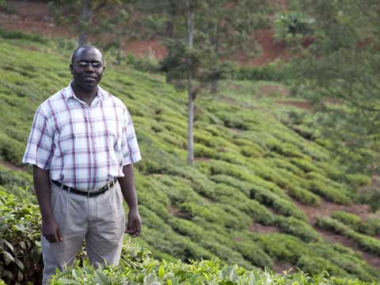
Honest, paywall-free news is rare. Please support our boldly independent journalism with a donation of any size.
From a presentation by Gathuru Mburu, edited by Simone Adler and Beverly Bell.
Gathuru Mburu is an ecologist and activist from Kenya. He is cofounder of the Institute for Culture and Ecology and part of the African Biodiversity Network, which is a member of the Alliance for Food Sovereignty in Africa.
Recolonization is happening. There is a second scramble, not just in Africa, but across the global South. Corporations started it. We need to name and shame these corporations – Monsanto, Syngenta, Cargill, and the program promoting them, AGRA [A Green Revolution for Africa] – to take this battle to the next level.
The wars [of conquest of Africa] have not actually ended – the artillery has just transformed into a different type against us farmers today. All of us are fighting.
Organizing From the Grassroots, to the National, to the International
The problems we’re facing today can’t be solved by individuals. The way to fight the war is through a collective approach.
The African Biodiversity Network is working to bring communities across Africa together and connect them to strengthen the grassroots. Communities are reviving their culture and their seeds, and forming local alliance which we call “communities of practice.” Then we connect these communities of practice at the local, national, and regional level, and they form active coalitions.
This is why the Alliance for Food Sovereignty in Africa formed, which consists of 13 networks collectively covering 40 of the 54 countries. We have huge strength. We can actually change farming, seeds, and culture en masse in Africa.
We are doing this first and foremost at the grassroots level, because our national and international campaign relies on people at the local level taking control, taking advocacy into their own hands. The national and international levels need to learn from the ground up to have credibility and be informed.
We also are learning from other countries which have progressed in having good seed laws or recognizing the work of family farmers. We are coming together to learn about good practices and the lessons from both the successes and failures in the movement.
If you look at Kenya where we have made some strides, we are engaging even the government. We are trying to contribute to policy-making on farming and the handling of seeds. A small example is the new constitution of Kenya. We managed to push and have the constitution itself recognize the diversity of seeds, including the farmer [local, indigenous] varieties. It was a big success for that coalition and we are going to keep pushing further. But we must always be vigilant to ensure that the spirit of the constitution is actually kept in the laws that are developed.
Reviving the Culture and Family Farming
Reviving the seed comes with reviving the culture, because it’s not only about the seed. You also need to bring back the context of that seed, which is the knowledge of the people, the knowledge held by elders, both men and women.
We have learned from the elders that traditional communities had very well-defined roles and responsibilities for men and women. There were specific seeds for men, and the same for women. So when bringing back the seeds, we’re bringing back the knowledge of women and of men. They are different but they are complementary. And if we are bringing back ecosystems in whole, using a holistic approach, then the two need to work together.
We also understand that our knowledge is not static. And we understand that other communities have their own knowledge. The important thing is how we connect these communities so that they can continue learning from one another and thereby strengthen one another.
Bringing back seeds and knowledge is also about bringing back rituals before planting, after planting, and before harvesting. It’s about celebration. You bring back life the way it used to be. It’s about restoring the whole ecosystem and people again.
The Strength of Spirituality and Common Principles
Reviving the culture is also about reviving the spirituality of the people. Even though African countries gained political independence, we did not gain the spiritual independence which is so critical to our development even today.
We first have to decolonize our minds because we are still carrying the shame of our ancestry. Unless we are able to shed this, our efforts are futile. It all starts in the mind. You can then look at issues from a different perspective, bringing the power inspired by your ancestors from within. You are then able to distill the answers and solutions to your problems from that ancestral knowledge.
So [our challenge is] to bring back the whole ecosystem. We are communities of humans, and the ecosystems are the other communities of the earth. These, plus our spirituality, are very important pillars in our work.
There was a meeting in Kenya that brought elders together from four different countries [South Africa, Kenya, Uganda and Ethiopia]. They were looking for common principles that can bring communities throughout Africa together. We are finding that even within the diversity across Africa, there are common threads, common principles, that join us together. We can derive our strength from that, so that we reclaim Africa from the yokes that we are still finding ourselves under.
Speaking against the authoritarian crackdown
In the midst of a nationwide attack on civil liberties, Truthout urgently needs your help.
Journalism is a critical tool in the fight against Trump and his extremist agenda. The right wing knows this — that’s why they’ve taken over many legacy media publications.
But we won’t let truth be replaced by propaganda. As the Trump administration works to silence dissent, please support nonprofit independent journalism. Truthout is almost entirely funded by individual giving, so a one-time or monthly donation goes a long way. Click below to sustain our work.